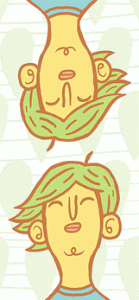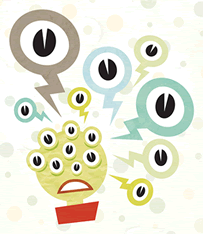Imagine if every time you walked into a room with a neatly turned down bed, you automatically took off your clothes and got into it — even though it wasn’t bedtime, wasn’t your bed, and wasn’t even your home. This might sound fanciful but it’s a documented behaviour of patients with attentional problems caused by brain damage (Lhermitte, 1983).
Many everyday occurrences can also be explained by attentional errors, like when we miss obvious changes in the environment, fail at sports or simply forget to put the milk back in the fridge. More seriously psychologists have found that attentional processes can play a role in psychological problems like anxiety, panic, insomnia, depression and obsessive-compulsive disorder.
Here are 18 ways attention can go wrong, some very common, some extremely unusual, a few downright weird; each giving us an insight into how our minds work.
1. Utilisation behaviour
Experienced by people who have suffered certain types of damage to the frontal lobes: patients find themselves unable to resist the routine actions suggested by objects around them. They will get into neatly turned down beds, even though it’s not their bed; they will put on glasses, even though they don’t wear glasses; and they will start eating when they see a plate and cutlery, even though the plate is empty and they’re not hungry. These strange behaviours, reported by Lhermitte (1983) and others, are partly caused by an inability to inhibit automatic behaviours, it’s like the old comedy standby of a distracted person continuing to spoon sugar into their coffee, except much more extreme.
2. Spatial neglect
Brain damage can produce weird shifts in behaviour and experience. People with damage to certain areas of the right hemisphere fail to pay full attention to things they see on their left (because of the way the brain is wired, the right hemisphere processes information about the left-visual-field). They may only eat the food on the right-hand-side of their plate, or only shave half their face. They seem to see things to the left, but not to notice them.
3. The rubber gloves illusion
Competition for attention between the senses can create strange illusions. In one spooky study by Spence et al. (2000), participants were made to ‘feel’ a touch on empty rubber gloves in front of them, despite their own hands being hidden from sight underneath the table, free from tactile sensation. This suggests information from the visual system can override attention to tactile sensation (or lack thereof) from the hands, to create an apparently impossible sensation.
4. Pain
Even more than sight, though, pain is the ultimate attention-grabber. Unsurprisingly people who experience chronic pain of one kind or another can find it difficult to concentrate (Ecclestone, 1995). Pain pulls sufferers’ attention away from task demands and forces them to continually re-focus to achieve their goal. One of the promising treatments for people suffering from chronic pain is ‘attentional management’: effectively helping people to direct less attention to their pain (Elomaa et al, 2009).
5. The cocktail party problem
The ‘cocktail party effect‘ is our impressive ability to tune our auditory attention to just one voice at a party. Unfortunately for those with hearing loss this can become the cocktail party problem, a difficulty in separating one voice from all the others. Hearing aids can be somewhat helpful, but often can’t restore full function (Marrone et al., 2008). This shows just how sensitive aural attention is to vocal characteristics: without precise information on spatial location, onset, offset, intensity and prosody, it’s much more difficult to pluck one voice from a multitude.
6. Alcohol myopia
My favourite technical term for the insidious effect alcohol has on attention. After a couple of beers long-term consequences of actions are ignored in favour of short-term impulses. The intoxicated become attentionally short-sighted, even failing to spot clear environmental cues that things are going to end badly. Of course I wouldn’t know anything about that: I just read it in a book. Ahem.

7. Errors of automaticity
When our attention is distracted we carry out highly practised behaviours automatically, occasionally at inappropriate times. Like putting the milk out and the cat in the fridge. In a classic diary study of everyday slips and lapses Reason (1979) got people to describe all sorts of cute out-of-context slips. One person reported unwrapping a sweet (candy to the rest of you), throwing the sweet away and putting the wrapper in his mouth, another to putting shaving cream on his toothbrush and another to going upstairs to change for the evening, then finding himself wearing pyjamas. Although practice makes perfect, it can also make an unthinking robot.
8. Inattentional & choice blindness
It’s absolutely incredible what changes people will miss when they’re distracted. Participants in psychology studies fail to spot a gorilla in plain sight (Simons & Chabris, 1999); don’t notice their conversational partner has suddenly changed mid-conversation, albeit hidden by a conveniently passing door (Simons & Levin, 1998); and frequently fail to recognise which of two people they originally chose as the most attractive (dubbed by the authors choice blindness).
9. Ironic processes of control
In fact sometimes attention is a real bear. What about when you really want to get something right, like putt the ball, hit a beautiful serve right in the corner or reverse the car into a narrow space? Naturally you concentrate even harder than normal, really focus. Unfortunately that just seems to make things worse: you miss the putt by a mile, frame the ball 50ft in the air and ding the car. What gives? These are what Wegner et al. (1998) call ‘ironic processes of control’. Sometimes too much attention is just as detrimental as too little.
10. Insomnia
It’s all very well smirking at the irony of people unable to putt, serve or park, but anyone who has suffered insomnia knows it’s no laughing matter. Attention gets a look in here as well. Recent research suggests that insomnia may be partly explained by an attentional bias towards ‘sleep-related threat’ (Harvey et al., 2005). In other words insomniacs keep themselves awake by focusing too much on the bodily sensations associated with sleep and any environmental noises that might be keeping them awake. Unfortunately also somewhat ironic.
11. Attention-deficit hyperactivity disorder (ADHD)
Now the most well-known of attention disorders, it consists of three broad types: (1) mostly inattentive, (2) mostly impulsive and hyperactive and (3) all three (jackpot). Those with the attention-deficit component find it difficult to concentrate, are easily distracted and likely to day-dream. The vast majority of those diagnosed with ADHD are children. ADHD is often partly treated with a stimulant (Ritalin), along with behaviour therapy.
12. Anxiety

You may be surprised to learn that anxiety is a sort of attention disorder, but being overly self-focused seems to be involved in many different mental health problems. Amongst people with social phobia and social anxiety their self-focused attention tends to maintain the problem (Spurr & Stopa, 2002). It makes perfect intuitive sense: a person continually thinking about themselves in social situations is bound to become more self-concious. Unfortunately it’s another rather ironic process.
13. Panic attacks
Paying too much attention to bodily processes is a strong feature of those who experience panic attacks. Clearly we should all pay some attention to our bodily processes – otherwise we’d just ignore the toothache and our teeth would drop out. But people who experience panic attacks are hypervigilant to somatic sensations (Schmidt et al. (1997). One person’s heartburn is another’s death-knell.
14. Hypochondriasis
And talking of paying too much attention to bodily sensations, you’ll be unsurprised to learn that hypochondriacs tend to be hypersensitive to odd twinges (Barsky et al., 1988).
15. Eating disorders
Again people with eating disorders like anorexia nervosa seem to have attentional biases around body image (Rieger et al., 1998)
16. Obsessive-compulsive disorder (OCD)
People with OCD typically carry out particular tasks — like hand-washing — repeatedly in order to relieve anxiety about an obsession. Excessive attention towards anxiety-inducing thoughts, particularly those that are threat-related seems to be at least partly to blame (Lavy, 1994).
17. Posttraumatic stress disorder (PTSD)
After experiencing a traumatic event, most people will recover given time, but to a significant minority relief is elusive. They experience flashbacks, nightmares and the feeling of losing control. Attention seems to be involved as PTSD sufferers are especially attracted to and vigilant for negative stimuli in the environment (Vythilingham, 2007).
18. Depression
Like those with PTSD, people experiencing depression also show an enhanced processing for negative stimuli (Ingram et al., 1994). One important maintaining process in depression is thought to be rumination. Individuals who are more prone to going over negative experiences again and again are more susceptible to developing clinical depression.
Well balanced
In many, perhaps all these examples of how attention can go wrong, it isn’t just attentional processes that are causing grief; psychological problems are frequently caused by many different factors. What this list does demonstrate, though, is how disruptions to attentional processes can cause or are involved in all kinds of different problems.
Something that psychologists are heard to say increasingly often is that the potential for many of these extreme experiences is within all of us. Anxiety, panic, insomnia and the rest are a part of the human condition – everyone can empathise to some extent.
What strikes home is how delicately balanced attentional processes have to be in order to produce pleasant everyday experience. Too little attention and it’s difficult to achieve goals in life, too much attention and it’s hard to break free from loops of negative thinking and feeling.
[Image credits: limonacido & limonacido & limonacido]

